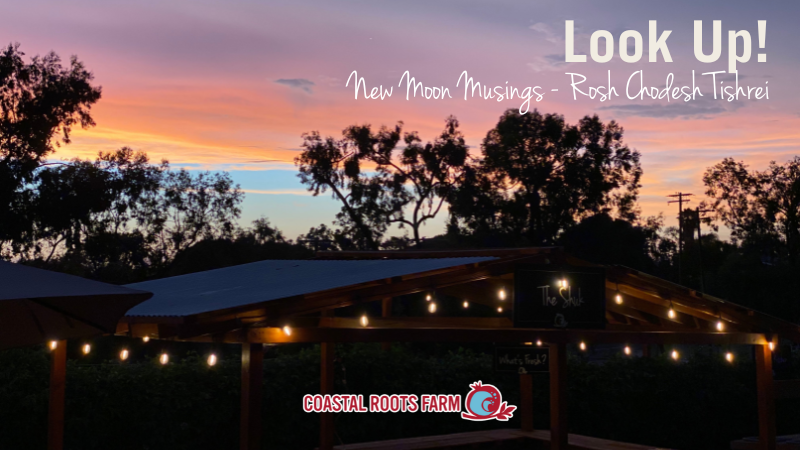Welcoming the Hebrew Month at Coastal Roots Farm
By Cantor Rebecca Joy Fletcher, Director of Jewish Life
Tishrei and the Jewish Ecological Calendar
At Coastal Roots Farm, we believe that Jewish time and ecological awareness are deeply intertwined. Our monthly blog series, New Moon Musings, honors each Rosh Chodesh—the new moon that marks a new month in the Jewish lunar calendar. As the moon renews, so do we, anchored in ancient cycles, guided by nature’s wisdom, and open to spiritual reflection.
On the evening of September 22, 2025, we welcome the month of Tishrei, a season of renewal and return.
What Happens in the Month of Tishrei?
Rosh Chodesh Tishrei coincides with Rosh Hashanah, the Jewish New Year. This year, Rosh Hashanah begins the evening of Monday, September 22, and continues through the evening of Wednesday, September 24.
Rosh Hashanah invites us into reflection, forgiveness, and repair. It is a time to pause and examine our relationships—with each other, with the earth, with the Divine, and with ourselves. Even when things feel broken, Tishrei reminds us that we can begin again.
This Rosh Hashanah guide to symbolic food and prayers from Adamah offers an introduction to the holiday's traditions.
The Practice of Apology and Repair
One of the core practices of Rosh Hashanah is to seek forgiveness from those we may have harmed. This may include family members, coworkers, or even those with whom we interact briefly in daily life—the cashier, the delivery driver, the neighbor we pass on the street. In a year marked by harsh words and divisions, the act of apology feels especially urgent.
Apologizing is rarely easy. It can stir up shame, regret, or fear of rejection. Also, for some of us, a past hurt may run too deep for forgiveness – at least any time soon. That is ok; the tradition encourages to consider small steps, with honesty and humility. Perfection is an unattainable goal within Jewish tradition, at least for human beings.
Tishrei and the Earth: Asking Forgiveness from The Earth
Our tradition teaches that the earth—trees, oceans, animals, mountains, and agricultural fields—is also our kin. As we reflect on forgiveness, we must also consider how we have harmed the living world . Many of us carry quiet guilt about the climate crisis or shame that we have not done enough to protect the planet. Perhaps it is time to release a bit of that guilt and shame.
Apologizing to the earth is not about self-blame. It is about releasing what weighs us down so that we can act with renewed clarity, love, and responsibility.
Here are some ways you might seek forgiveness and take action:
- Write a letter to a part of the natural world—perhaps a tree, the ocean, or the soil—expressing gratitude, apology, and the intention to do better. Be specific and name small, achievable actions. For inspiration, see Seven Proven Ways to Help the Planet.
- Choose one or two plant-based meals each week instead of eating meat.
- Donate to an environmental or climate justice cause.
- Shop at our Farm Stand, or support local farmers markets
- Volunteer for an ocean or beach clean-up.
- Join our new Dayenu Circle at the Farm, gathering monthly to work on CA advocacy campaigns for the earth with hope and purpose.
Or consider a meditative practice: sit quietly in nature, speak your apology, and listen. It may feel strange at first, but if you allow yourself to be still, you may sense a response, maybe even a whisper of forgiveness. Apologies from the earth cannot fix what is already lost, but they can soften our hearts and open us to deeper action.
A Year of Forgiveness, Renewal, and Repair
As we enter Tishrei, may we open ourselves to vulnerability, compassion, and courage. May this season bring renewal for us, for our neighbors, for our nation, for Israel and Gaza, for all who are suffering across this great world, and for our endlessly living mother earth.
Shana Tova – a good and sweet new year!
